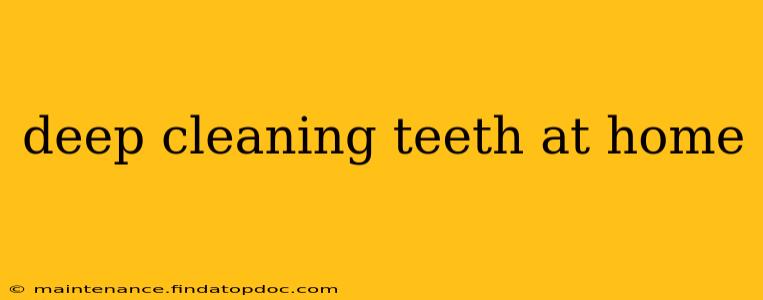Maintaining optimal oral hygiene is crucial for preventing cavities, gum disease, and bad breath. While regular brushing and flossing are essential, sometimes your teeth need a more thorough cleaning. This guide will explore effective techniques for deep cleaning your teeth at home, addressing common questions and concerns. Remember, this information is for supplemental home care and does not replace professional dental cleanings. Regular visits to your dentist are still vital for comprehensive oral health.
What Does Deep Cleaning Teeth at Home Entail?
Deep cleaning your teeth at home goes beyond your typical brushing and flossing routine. It involves employing specialized techniques and tools to remove plaque, tartar buildup, and surface stains more effectively. This can include using specific types of toothbrushes, interdental brushes, and mouthwashes, as well as paying close attention to your brushing technique. It's about achieving a higher level of cleanliness than a standard routine provides.
How Often Should You Deep Clean Your Teeth at Home?
There's no single answer to this question. It depends on several factors, including your individual oral hygiene practices, diet, and susceptibility to plaque buildup. However, aiming for a deep clean at least once a week is a good starting point. This could involve a more thorough brushing and flossing session, incorporating an interdental cleaner, and using a whitening mouthwash. If you notice increased plaque buildup or staining, you might need to increase the frequency.
What are the Best Tools for Deep Cleaning Teeth at Home?
Several tools can elevate your at-home cleaning routine:
-
Electric Toothbrush: Electric toothbrushes, particularly those with oscillating-rotating or sonic technology, can significantly improve plaque removal compared to manual toothbrushes. Look for models with different brushing modes for a customized clean.
-
Interdental Brushes: These small, cylindrical brushes are designed to clean between your teeth, where your toothbrush bristles can't reach effectively. They're especially helpful for those with wider gaps between teeth or orthodontic appliances.
-
Dental Floss: Using dental floss daily is essential for removing plaque and food particles from between your teeth. Consider using floss picks for easier handling.
-
Water Flosser (Oral Irrigator): A water flosser uses a pulsating stream of water to clean between teeth and along the gumline. This can be particularly beneficial for those with braces or implants.
-
Tongue Scraper: Don't forget your tongue! A tongue scraper helps remove bacteria and debris that contribute to bad breath.
What is the Best Technique for Deep Cleaning Teeth at Home?
A successful deep clean involves a meticulous approach:
-
Brush for Two Minutes: Use gentle, circular motions, paying attention to each tooth surface. Don't scrub too hard, as this can damage your gums.
-
Floss Thoroughly: Guide the floss gently between each tooth, curving it around the base of each tooth.
-
Use Interdental Brushes: If needed, use interdental brushes to reach those hard-to-clean areas between your teeth.
-
Rinse with Mouthwash: Use an antiseptic mouthwash to help kill bacteria and freshen your breath.
-
Use a Tongue Scraper: Gently scrape your tongue from back to front to remove bacteria and debris.
Can Baking Soda Help Deep Clean Teeth?
Baking soda can help whiten teeth and remove surface stains, but it's crucial to use it correctly. Mix a small amount of baking soda with toothpaste and brush gently. Avoid overuse, as it can erode tooth enamel over time.
How Can I Prevent Tartar Buildup?
Tartar, or calculus, is hardened plaque that requires professional cleaning. To minimize tartar buildup:
-
Brush and Floss Regularly: Consistent oral hygiene is the best prevention.
-
Maintain a Healthy Diet: Limit sugary and acidic foods and drinks, which contribute to plaque formation.
-
Schedule Regular Dental Checkups: Professional cleanings remove tartar and prevent it from accumulating.
Remember, while these techniques can significantly improve your oral hygiene, they should be used in conjunction with regular visits to your dentist for professional cleanings and checkups. A dentist can identify and address any underlying issues that may require additional attention. Prioritize your oral health, and enjoy a brighter, healthier smile!
